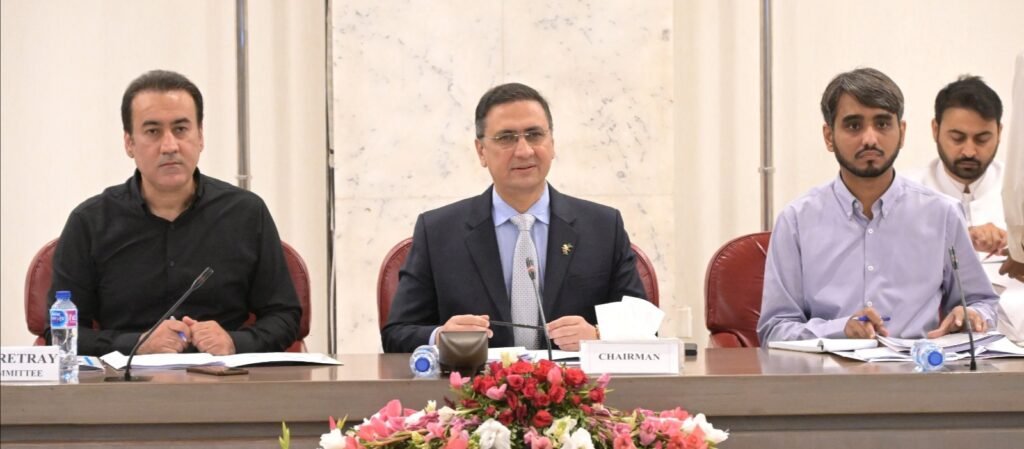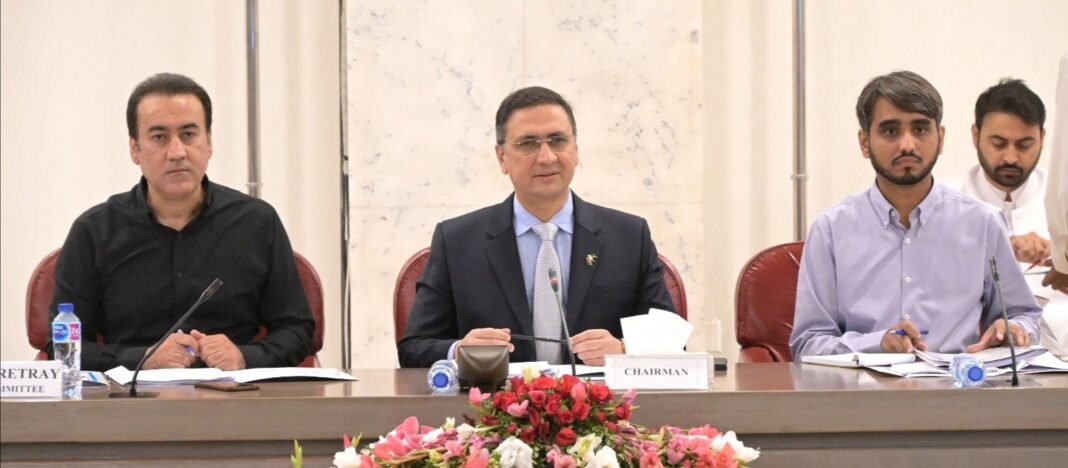
STANDING COMMITTEE ON NATIONAL FOOD SECURITY AND RESEARCH HELD A MEETING.
Islamabad, Standing Committee on National Food Security and Research convened its 18th meeting in Constitution Room of the Parliament House, under the chairmanship of Syed Tariq Hussain, Member of the National Assembly.
The Committee, along with the Chairman, welcomed MNA Mir Ghulam Ali Talpur to the meeting and granted him the status of a Special Invitee.
The Ministry of National Food Security and Research briefed the Standing Committee on the newly formulated National Seed Policy, developed following the 2024 amendment to the Seed Act a significant achievement credited to the Committee’s efforts.
Key reforms outlined in the policy involve capacity-building initiatives targeting a wide range of stakeholders, including government officials, seed companies, dealers, and farmers. The policy also proposes merging the Federal Seed Certification and Registration Department (FSC&RD) with the National Seed Development and Regulatory Authority (NSDRA). Under the policy, farmers will be empowered to verify the authenticity of seeds using an SMS-based verification system. The reforms also encompass legislative updates, incentives to encourage private sector investment in seed research and development, improvements in cotton seed varieties, and the introduction of a seed company classification system. Additionally, via this policy the Ministry will prevent the promotion of unapproved seeds through stringent controls on media advertising.
The Committee was informed of several persistent challenges faced by the seed sector. These include a low seed replacement rate, high dependency on imports, limited seed exports, and inadequate research and development. Other concerns include the prevalence of counterfeit seeds, lack of awareness among farmers, resistance to GMOs, restricted access to elite germplasm, insufficient skilled human resources, poor infrastructure, and weak inter-agency coordination. It was also highlighted that legal actions against companies selling fake seeds are often not effectively prosecuted.
In response, the Committee resolved to call upon the Ministry of Law and Justice in the next meeting and to involve provincial governments to ensure stricter enforcement of seed-related regulations. It was emphasized that without coordinated legal and administrative action, the benefits of the new Seed Policy may remain unrealized.
The expected outcomes of the Seed Policy as shared include increased crop productivity, improved food security, and enhanced price stability in agricultural markets. The policy also aims to safeguard farmers’ interests, improve foreign exchange reserves through better export potential, and facilitate access to regional markets. Additionally, it is expected to generate employment opportunities, advance research and development within the seed sector, and foster increased participation and investment from the private sector.
The Committee acknowledged the Ministry’s efforts and expressed hope that the initiatives would be effectively implemented to support the growth and development of Pakistan’s agriculture sector.
The Committee reviewed Agenda Item No. 3, a Point of Order raised by Mr. Asad Qaiser, MNA, and others, highlighting the challenges faced by tobacco growers and emphasizing the urgent need for a comprehensive policy to address their concerns.
In this context, the Pakistan Tobacco Board (PTB) briefed the Committee on the status of implementing its previous recommendations; however, the Committee expressed dissatisfaction with the progress. During the meeting, tobacco growers highlighted several pressing concerns, including limited purchase quotas, low procurement prices for high-quality tobacco, arbitrary rejection of crops by companies, mistreatment of farmers at buying centers, companies preferring to buy from dealers rather than directly from farmers, and a substantial reduction in the purchase quota from 36 million kg to 24 million kg over the past two years.
In response, the Committee recommended that the Secretary of the Ministry of National Food Security and Research to convene a meeting with Hon. Members of the National Assembly, Pakistan Tobacco Board (PTB), Pakistan Tobacco Company (PTC), National Seed Development and Regulatory Authority (NSDRA), Federal Board of Revenue (FBR), and tobacco growers to address outstanding issues and submit a report within one week.
Furthermore, the Committee asked the Ministry to finalize the appointment of board members before the next meeting and provide an update on tobacco research varieties developed by PTB over the last five years. The Ministry was also urged to promote solar-powered processing technologies in the tobacco sector, pursue government-to-government export agreements, organize exhibitions to showcase tobacco products to international buyers, and prioritize the development of export-oriented tobacco varieties, especially those used for fillers and flavoring.
The meeting was attended by the following Honorable Members of the Standing Committee: Rana Muhammad Hayat Khan, MNA; Mr. Waseem Qadir, MNA; Mr. Nadeem Abbas, MNA; Chaudhary Iftikhar Nazir, MNA; Mr. Abdul Qadir Khan, MNA; Syed Abrar Ali Shah, MNA (via Zoom); Mr. Zulfiqar Ali Behan, MNA; Mr. Usman Ali, MNA; Mr. Usama Hamza, MNA; Mr. Javaid Iqbal, MNA; Mr. Muhammad Ameer Sultan, MNA; and Syed Ayaz Ali Shah Sheerazi, MNA (via Zoom). Additionally, Mr. Asad Qaiser, MNA and Mover of the Point of Order, along with Mr. Shehram Khan Tarakai and Mir Ghulam Ali Talpur, MNA/Special Invitee, also participated in the proceedings.
Senior officials and representatives from the Ministry of National Food Security and Research, Pakistan Agricultural Research Council (PARC), National Seed Development and Regulatory Authority (NSDRA), and other relevant departments also attended the meeting.
Sohail Majeed is a Special Correspondent at The Diplomatic Insight. He has twelve plus years of experience in journalism & reporting. He covers International Affairs, Diplomacy, UN, Sports, Climate Change, Economy, Technology, and Health.






![logo-1[1]](https://globalnewspakistan.com/wp-content/uploads/2025/01/logo-11-e1737618310315-300x187.png)